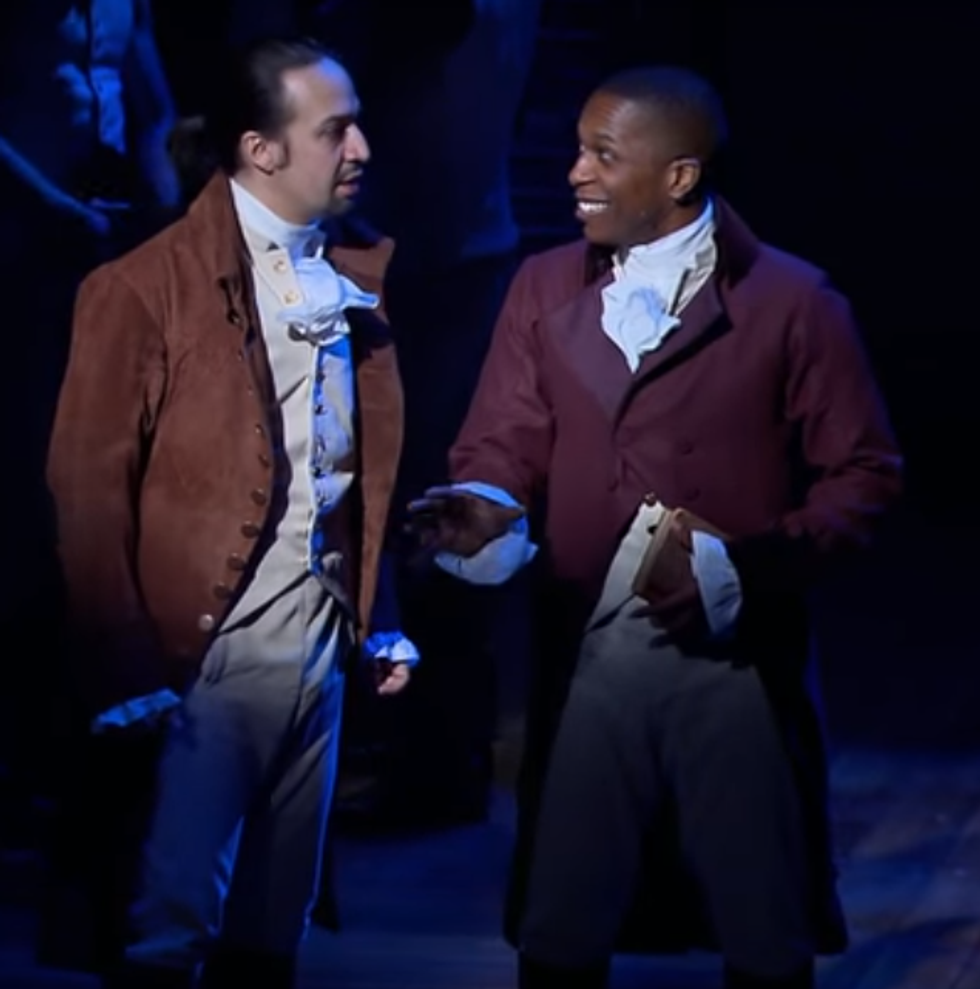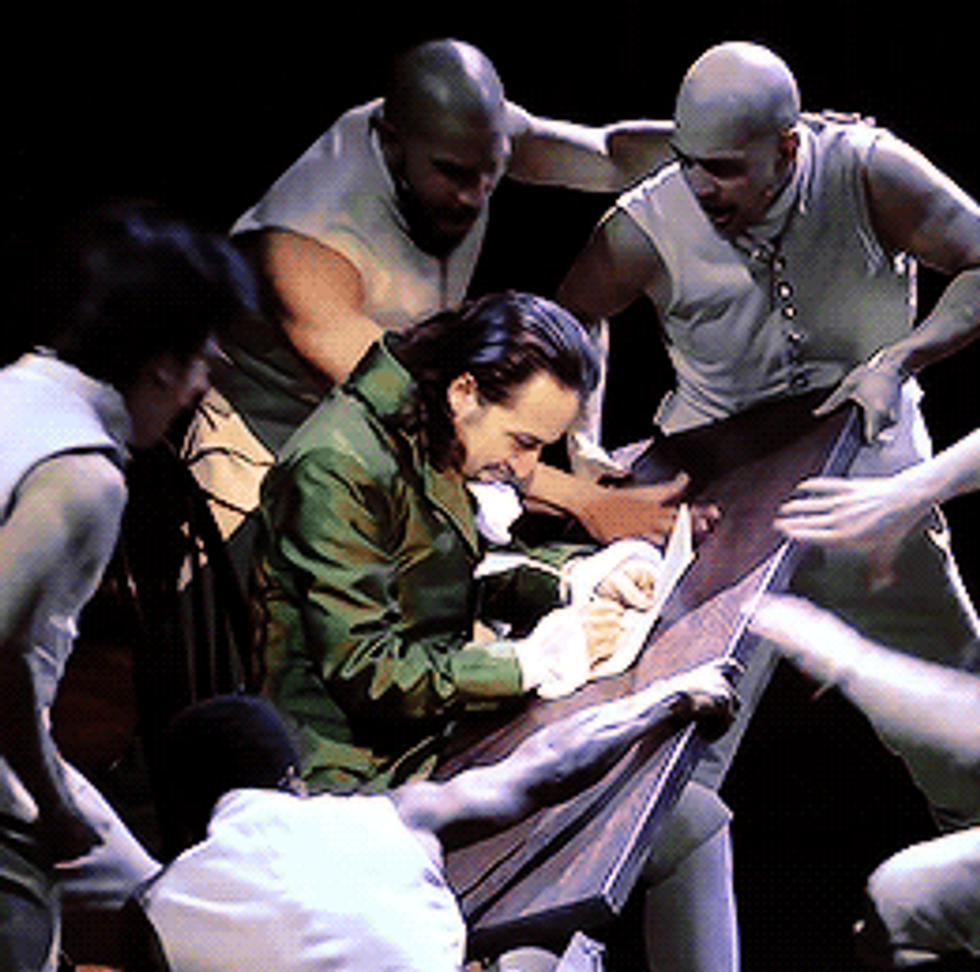Alexander Hamilton is remembered for being the founder of the U.S. Treasury, but I think he was really an English major at heart. After all, the dude wrote 51 essays for the Federalist Papers in, like, five minutes. His legacy as the ten dollar founding father survives because of his financial contributions to our country, but if anyone understands the life of an English major, I think it's Hamilton.
1. Hamilton was, from the very beginning, a voracious reader.
"...He started working, clerking for his late mother's landlord / Trading sugar cane and rum and all the things he can't afford /
When we first meet Hamilton, he's broke and barely able to survive, but is spending what little money he has on books. As a broke college kid majoring in English (surrounded by other broke college kids also majoring in English), I think I can safely say that we are all in the same boat as Hamilton here. We may not have food in our refrigerators, but we are surrounded at all times by a fort of books.
2. Hamilton had an innate gift for writing, and it saved his life.
"Our man saw his future drip, dripping down the drain / Put a pencil to his temple, connected it to his brain / And he wrote his first refrain, a testament to his pain / Well the word got around, they said,'This kid is insane, man!' / Took up a collection just to send him to the mainland / 'Get your education, don't forget from whence you came...'"
When Hamilton's childhood village in the Caribbean was destroyed by a hurricane, he wrote a piece for the local newspaper about the devastation. His writing was so eloquent and impressive for his age that the town raised funds to send him to America for his education. If that's not the mark of a supremely gifted writer, I don't know what is. Like Hamilton, many English majors possess an inherent talent with words -- perhaps not so impressive a talent that our hometowns raise money for us to go to school abroad, but still.
3. One of the first things Hamilton does when he gets to America is to punch a bursar.
"I was seeking an accelerated course of study when I got sort of out of sorts with a buddy of yours / I may have punched him / It's a blur, sir / He handles the financials -- / You punched the bursar? / Yes..."
This is at the top of every English major's list: find the first person available who does math for a living, and punch them.
4. Hamilton is a gifted public speaker.
"I'm a diamond in the rough, a shiny piece of coal / Tryin' to reach my goal / My power of speech: unimpeachable"
"Oh, am I talking too loud? / Sometimes I get overexcited, shoot off at the mouth / I've never had a group of friends before / I promise that I'll make y'all proud. / Let's get this guy in front of a crowd!"
English majors are usually a triple threat: great readers, writers, and speakers. Hamilton has all 3 checked. (He says so in "My Shot," and John Laurens backs him up.)
5. Hamilton keeps great correspondence, both personal and political.
"You built me palaces out of paragraphs / You built cathedrals"
"I have never seen the general so despondent / I have taken over writing all his correspondence..."
Hamilton just can't get enough of writing. He has such a talent for it that his love letters make Eliza Schuyler fall for him in like two weeks, and George Washington almost immediately hires him to keep his journals and correspondence with Congress during the war. Much like Hamilton, English majors are almost notoriously known as the best writers in the room.
6. Hamilton has a habit of storytelling every situation he's in.
"I imagine death so much it feels more like a memory / This is where it gets me: on my feet, the enemy ahead of me / If this is the end of me, at least I have a friend with me / Weapon in my hand, a command, and my men with me"
Before Hamilton's first battle even begins, he's already narrating the story of his own death: surrounded by his comrades, bravely fighting for freedom as the leader of a battalion. The only problem is, none of that has happened. Hamilton's instinct to create a narrative out of everything is something that many English majors can relate to. As experts in literature, we are trained to see story in everything, even if that attitude can sometimes be unproductive or dangerous like it is for Hamilton here (he almost lets himself get carried away with his death fantasy, before remembering that he has pregnant a wife at home).
7. Did I mention that Hamilton literally never stops writing?
" How do you write like tomorrow won't arrive? / How do you write like you need it to survive? / How do you write every second you're alive?"
"And when my prayers to God were met with indifference / I picked up a pen, I wrote my own deliverance"
Hamilton writes his way out of poverty in the Caribbean. He writes correspondence and journals both for himself and for Washington in the war. He obsessively writes political material as a lawyer after the war. He writes himself into a corner with the Reynolds Pamphlet. He singlehandedly writes 51 essays for the Federalist Papers in the span of 6 months. He slams his political enemies via newspaper articles constantly. He literally never put a pen down in his life. To which we English majors say, #relatable.
8. Hamilton doesn't shy away from million-dollar words.
Seriously, who says the word "intransigent," even in the 18th century? That's right, English majors.
9. Hamilton is totally not above dropping random Shakespeare references into everyday conversation.
"My dearest Angelica: / 'Tomorrow and tomorrow and tomorrow' creeps in, this petty pace from day to day / I trust you'll understand the reference to another Scottish tragedy without my having to name the play / They think me Macbeth, ambition is my folly..."
He can't resist referencing Macbeth in a letter to Angelica. Indeed, the urge is so strong that he feels the need to explain the reference right after making it. We get it, Ham, you like Shakespeare. We all do.
10. No matter his other skills, writing was always Hamilton's biggest asset.
"Hamilton is a host unto himself. As long as he can hold a pen, he's a threat."
Hamilton clearly had a mind for figures and economic policy. He would never have been made Secretary of the Treasury otherwise. But his skill with writing throughout his life is what kept him working and growing and learning and influencing change in the years before his strong federal influence. No matter what he was writing, he was writing it well. English majors understand this kind of interdisciplinary skill very well.
He's one of us.






















